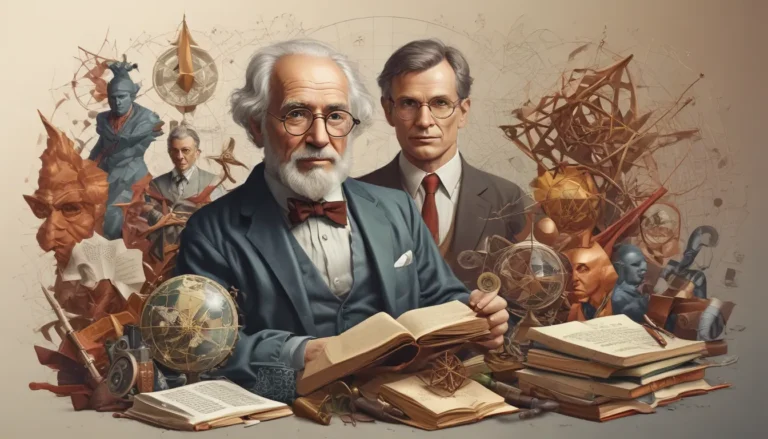The images in our articles may not match the content exactly. They are used to grab your attention, not to show the exact details in the text. The images complement the text but do not replace it.
Karl Popper, a prominent figure in the world of philosophy, was born on July 28, 1902, in Vienna, Austria. Throughout his life, Popper made significant contributions to the fields of epistemology and the philosophy of science, revolutionizing our understanding of how scientific theories should be evaluated and tested. Let’s delve into 13 fascinating facts about Karl Popper, shedding light on his life, achievements, and intellectual contributions.
Unveiling the Life of Karl Popper
Karl Popper, born in Vienna in 1902, gained recognition as one of the most influential philosophers of the 20th century. His groundbreaking work focused on the nature of scientific inquiry and the concept of falsifiability.
Popper proposed the theory of falsification, arguing that scientific theories should be testable and open to being disproven. This principle revolutionized the field of science by emphasizing the importance of evidence and empirical observation.
Critique of Traditional Views
Popper was critical of historicism, rejecting the idea that historical events follow predetermined patterns. He believed that historical development should be viewed as unpredictable and influenced by contingent factors.
He defended the principle of methodological individualism, which asserts that social phenomena can be explained by the actions and decisions of individuals rather than solely by societal or structural factors.
Influence on Various Fields
Popper’s philosophy of science had a profound impact on the field of economics. His ideas on falsifiability and the nature of scientific inquiry influenced the methodology of economics, advocating that economic theories should be subjected to rigorous testing and empirical scrutiny.
He popularized the term “open society” through his extensive analysis of the concept, promoting a society where individuals are free to express themselves and make choices. His book, “The Open Society and Its Enemies,” became a classic work in political philosophy.
Escaping Persecution and Academic Pursuits
As a Jew, Popper fled Austria in 1937 to escape Nazi persecution. He settled in New Zealand, where he continued his intellectual pursuits and wrote some of his most influential works.
After leaving New Zealand, Popper became a professor at the London School of Economics and Political Science. He held the position of professor of logic and scientific method, further solidifying his reputation as a leading philosopher.
Philosophical Views and Critiques
Popper criticized the concept of utopia, arguing against the idea of achieving a perfect utopian society. He believed that such endeavors could lead to authoritarianism and instead advocated for incremental changes based on critical thinking and rational decision-making.
He engaged in debates with notable philosophers such as Ludwig Wittgenstein and Thomas Kuhn, sparking lively discussions that further refined his philosophical views.
Legacy and Recognition
Throughout his career, Popper received several prestigious awards for his contributions to philosophy, including the Austrian Cross of Honour for Science and Art and the Kluge Prize for Lifetime Achievement in the Humanities.
Popper’s advocacy for critical rationalism, emphasizing the importance of questioning and critically evaluating ideas, has had a lasting impact on a wide range of disciplines. His work continues to influence philosophy, science, political theory, and social sciences.
Conclusion: Embracing Popper’s Intellectual Legacy
In conclusion, Karl Popper’s groundbreaking ideas on falsifiability, critical thinking, and the scientific method have shaped our approach to knowledge and scientific discovery. His emphasis on continuous scrutiny and improvement of scientific theories ensures that progress remains rigorous and robust. Popper’s intellectual legacy will undoubtedly inspire future generations of thinkers and scientists.
FAQs
-
Who was Karl Popper?
Karl Popper was an Austrian-British philosopher and scientist known for his contributions to the philosophy of science and his critique of traditional views of scientific practice. -
What are some of Karl Popper’s key ideas?
Karl Popper’s key ideas include the concept of falsifiability, which states that for a theory to be considered scientific, it must be capable of being proven false through empirical testing. -
How did Karl Popper revolutionize the philosophy of science?
Karl Popper revolutionized the philosophy of science by challenging the traditional view that theories can be proven true. He argued that scientific theories can only be proven false through empirical testing, leading to the development of his concept of falsifiability. -
What is the significance of Karl Popper’s ideas on scientific inquiry?
Karl Popper’s ideas emphasize the importance of critical thinking and continual evaluation of scientific theories. His work has had a profound impact on the way scientific research is conducted, ensuring theories are constantly tested and refined. -
How has Karl Popper’s work influenced the field of epistemology?
Karl Popper’s work has significantly influenced the field of epistemology by highlighting the fallibility of human knowledge and critiquing traditional views of justification and certainty. His ideas have shaped contemporary theories of knowledge.
Explore the captivating facts surrounding other influential thinkers, such as Immanuel Kant, whose work delves into the nature of knowledge, ethics, and the human experience. Kant stands as one of the most important figures in modern philosophy, alongside the legacy of Karl Popper.
Reflecting on Trustworthy Content
Our commitment to delivering high-quality and engaging content ensures that each fact on our site is contributed by real users, bringing diverse insights and information to our readers. Our editors work diligently to review each submission, maintaining the highest standards of accuracy and reliability. Trust in our dedication to providing credible and fascinating content as you explore and learn with us.






